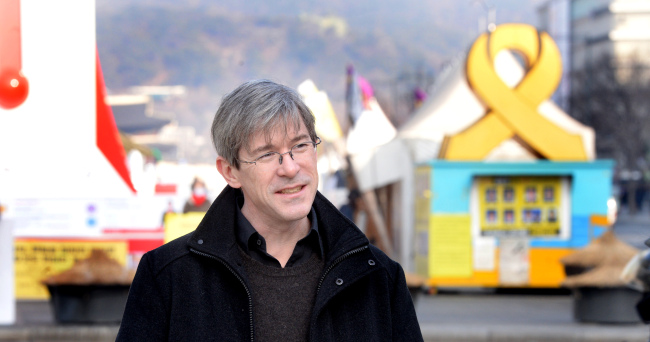Darcy Paquet, an American film critic specializing in Korean films, says that directors here seem to have a more intimate relationship with their viewers.
“Korean films are so widely watched by the local audience that there is a real dialogue that takes place,” he told The Korea Herald in an interview Tuesday at a cafe in Seoul’s Gwanghwamun district.
“In most countries, Hollywood films dominate theaters. Filmmakers there are making films for a smaller audience,” he said. Korean filmmakers, however, seem to put a “lot of thought into what the big issues of the day are,” he noted. “They want to make films that are entertaining but also say something about contemporary society.”
Such films, featuring criminal gangs, corrupt politicians and the absurdly wealthy are generally recognized as a recipe for success in the Korean box office, he said, speaking on behalf of people’s frustrations with the societal structure.
“It’s partly a commercial strategy. But I do think on one level directors want to communicate with viewers.”
Paquet, originally from Minnesota and now living in Korea, has been active in Korea’s film scene since 1997 and is now recognized as an authority in the field. He is the founder and editor of a website dedicated to Korean film review -- Koreanfilm.org -- and the author of “New Korean Cinema: Breaking the Waves” (2009), which charts the dramatic evolution of the Korean film industry since the country’s democratization.
In 2013, he founded the Wildflower Film Awards Korea, which recognizes achievements in Korean independent and low-budget films. He is also a consultant for the San Sebastian International Film Festival in Spain and the Udine Far East Film Festival in Italy, and a former correspondent for Variety and Screen International, outlets specializing in film.
Subtitling Korean films
Koreans and foreigners often wonder at the scant availability of subtitled Korean films in theaters here, despite the rising international popularity of Korean cinema and its directors.
Pacquet says there is definitely a demand for subtitled Korean films.
“When people come to Korea they want to learn about the culture, and films are a good way to do that.”
Scheduling subtitled films for box office primetime hours, however, presents a practical problem for cinemas.
“Most of the screenings (for subtitled films) are on weekdays. They’re hard to market.”
It is hard to subtitle films for all viewings, he said, as most Korean moviegoers are sensitive to visuals and die-hard cinephiles find even the smallest etches onscreen distracting.
Pacquet deemed 2016 a “really good year for Korean films,” naming a list of works that achieved global prominence last year.
“It might just have been coincidence, but a lot of talented directors released their films,” he said.
One significant release was “Train to Busan,” directed by Yeon Sang-ho, Paquet noted.
“It’s very well-made both on a technical level and an emotional level,” he said. “It’s hard to have a minor character who’s memorable… but there are a lot in that film.”
The zombies’ choreography in particular was striking, he said. “All these images you have of zombie crowds crashing through the barriers onto the train … it was intense.”
The film’s emotional difference also set it apart from other similar flicks, Paquet noted.
“One comment I heard was, ‘I never expected to cry at the end of a zombie film.’ I think that’s why international viewers got a different feel from it.”
Pacquet, like many critics here, picked Na Hong-jin’s occult thriller “The Wailing (Goksung)” as his favorite. He had participated in writing the English subtitles for the film’s international screening.
“I know there are many people who don’t like it. It was a good match with my personality,” he said. “It was very intense, on an emotional scale, to watch. People talk about having shivers down their spines in movies -- it doesn’t actually physically happen. But it does here.”
Because the film can be interpreted in a myriad of ways, he added, it provides a feast of thought and analysis for viewers and, in particular, critics.
Pacquet also participated in creating the subtitles for “The Handmaiden,” a lesbian romance-thriller directed by Park Chan-wook, who shot to international acclaim with his 2003 neo-noir mystery thriller “Oldboy.”
Throughout the three-month project, Pacquet was able to work closely with director Park.
“He’s very detail-focused,” he said. “He’s making very small changes to the film right up until the very end. Dialogue, narration, that kind of thing. He experiments with a lot of different variations before settling on the final choice.”
Pacquet noted that Park had a good command of the English language and was sensitive to its nuances.
“He writes dialogue in a very creative way. He puts a lot of meaning into it. It’s very dense. Some directors prefer translation that feels natural, like spoken English, but Park is willing to make it sound more unnatural... like poetry.”
Pacquet has worked on translating films for a host of other distinguished directors here, including Bong Joon-ho and Hong Sang-soo (“Yourself and Yours,” 2016). He will also be working on the subtitles for the much-anticipated historical film “Battleship Island,” starring Song Joong-ki, tentatively slated for summer release, among other films.
Paquet also commented on international audience’s perception of Asian cinema.
“Asian films have been marketed in the West either as extreme films of genre films, or as … austere, minimalist films. Those are the two dominant images.”
But directors like Park and Na are increasingly “doing really creative things genre-wise,” he said. “Even though they’re completely unique, it’s easier to sell them abroad because people are looking at Asian films themselves as a genre.”
By Rumy Doo
(
doo@heraldcorp.com)




![[Weekender] Korea's traditional sauce culture gains global recognition](http://res.heraldm.com/phpwas/restmb_idxmake.php?idx=644&simg=/content/image/2024/11/21/20241121050153_0.jpg)



